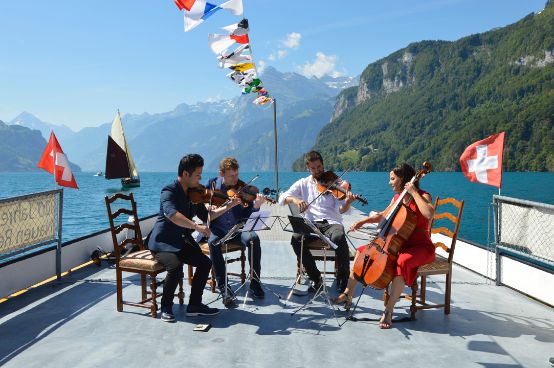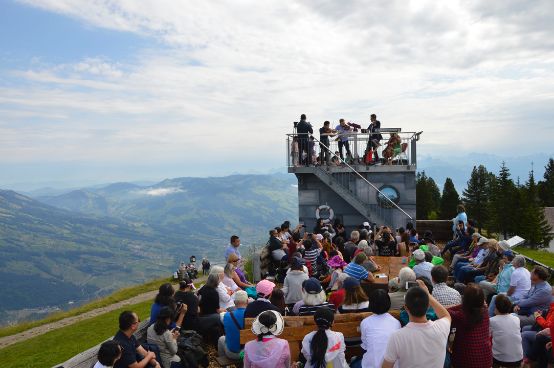Stradivarifest in Gersau
The Stradivari Quartet played at unusual concert venues in Gersau and the surrounding area and held a "Stradivariclass" for the first time.

In addition to top-class interpretations, the Swiss Stradivari Quartet is always characterized by creative and unusual concert forms and venues. This was also evident at the recently concluded Stradivari festival in Gersau and the surrounding area. It opened with the Mythenkonzert in the Mythensaal of the Waldstätterhof Hotel in Brunn. The cellist and leader of the quartet, Maja Weber, made an excellent start with Sergei Rachmaninov's Sonata in G minor op. 19 as a duo with pianist Per Lundberg and - expanded into a trio by violinist Xiaoming Wang - with Franz Schubert's Trio in B flat major D 898.
At the concert in the parish church in Gersau, the Stradivari Quartet, completed by Sebastian Bohren, violin, and Lech Uszynski, viola, presented a tried and tested combination of works with Maurice Ravel's and Claude Debussy's string quartets. Between the two French compositions, the Trois pièces pour quatuor à cordes by Igor Stravinsky provided a refreshing and invigorating contrast that probably even irritated some members of the audience. However, the standing ovation at the end of the concert also made it clear that they had experienced an excellently interpreted musical program.
On the mountain and across the lake
At the matinee on Rigi Scheidegg, the Stradivari Quartet played tangos by Astor Piazzolla on a stylized ark with a 360-degree panoramic view. Unusual concert environments always offer the opportunity for unusual musical experiences. This, and not the cheap attempt to be "different", is the reason why the quartet does not shy away from surprising concert venues. It goes without saying that the different performance conditions often pose challenging interpretational demands. However, the audience felt none of this.
The Gersau lake stage and the evening atmosphere over Lake Lucerne provided the setting for the Serenade on the Lake with Felix Mendelssohn's String Quartet in A minor op. 13 and Franz Schubert's Octet for clarinet, horn, bassoon, string quartet and double bass in F major D 803. The fascinating ensemble of nature, outstanding compositions and inspired and committed performers provided a musical experience of a special kind: intimate chamber music, passages of symphonic gesture, virtuoso and sometimes brilliant solo performances as well as audible and visible, clever dialogue and communication alternated.
The concerts at Tell's Chapel and on the Rütli, Switzerland's most famous meadow, were also characterized by the respective genius loci. At the former, for example, a version of the overture to Gioacchino Rossini's opera William Tell and on the Rütli, true to the concert motto "Musical Swiss Delicacies", works by Adolf Reichel (Walk(String Quartet No. 2 in C major) by the composer Othmar Schoeck from Brunner and other Swiss composers. As a musical reference to the four cantons around Lake Lucerne, folk music pieces from Uri, Schwyz, Unterwalden and Lucerne were specially arranged for the Rütlikon concert. "Can and should we do that?", chamber music purists may ask. The answer in both cases is yes, if the result is presented so respectfully and coherently and the concert circumstances invite it. In any case, there was not a trace of ingratiating folksiness to be heard.
The Gersau Nauen "Republik" offered another very unconventional concert platform. The audience on the traditional former transport barge was joined by 70 other people who had traveled from China especially for the so-called Stradivariclass as part of the Gersau Stradivarifest. They listened to the sounds of the quartet on board a social boat moored on the "high seas" at Nauen. Once again, it was interesting to experience works in an environment that allowed different facets of the compositions to be experienced than in the usual concert venues. This exploration of acoustic potentials and extra-musical effects on perception is a matter close to the Stradivari Quartet's heart.
-

- Photo: Denise Gerth
- Tangos in the Arche on the Rigi Scheidegg
A kind of master class
The musicians of the quartet and pianist Per Lundberg offered lessons for talented children and young people from China for the first time under the Stradivariclass label. The 30 or so pupils experienced a true master class atmosphere in individual lessons. Here and by attending concerts with their teachers, they learned some of the secrets of successful professional musicians. The young Chinese talents presented what they had learned in a concert at the Parkhotel Vitznau. With this new offering, the Stradivari Quartet, which tours China, Korea and other Asian countries several times a year, provided a platform for an exciting artistic, social and cultural exchange. It is to be hoped that this latest commitment will be repeated in the coming years. Allow the author one idea: What if the quartet members were to offer coaching for young string quartets or trios?
Detailed information about the quartet (director, members, instruments, concerts) and other related offers are listed here:








